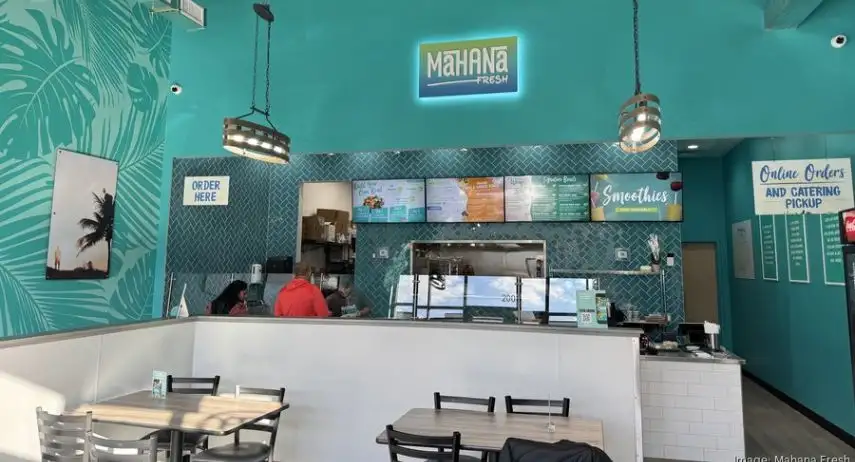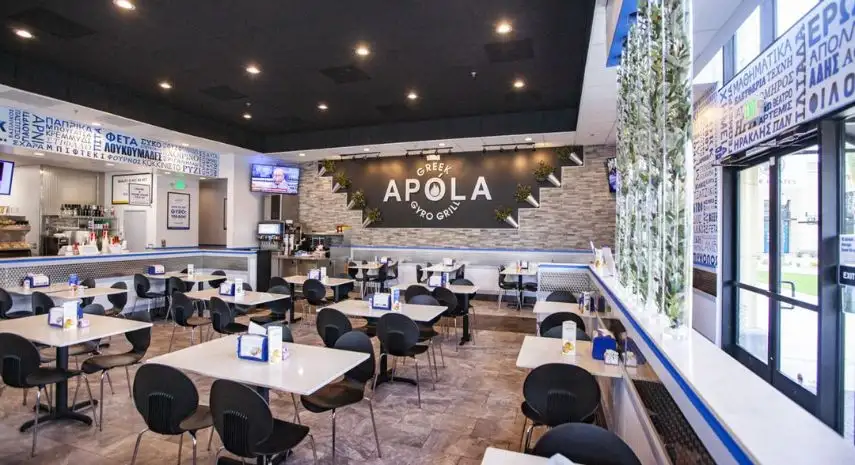Established
2019
Franchise Units
29
Minimum Investment
$150,000
Franchise Fee
$30,000
Total Investment Range
$350,000
Home Based
No
Description
Step into a franchise opportunity that combines purpose-driven service with strong market demand: the FTC Kitchen franchise invites you to join a rapidly-growing catering concept built around nutrition-focused meals and a strong social mission. As you explore this opportunity in the U.S. market, you’ll find a concept positioned not simply as a catering business, but as a trusted partner to treatment centers, senior care homes, and wellness-focused communities. FTC Kitchen has carved a niche in the underserved “nutrition-safe catering” category, offering diabetic-friendly, vegan, gluten-free, and low-sodium meals.
In launching your FTC Kitchen franchise, you’re not just buying a food-service business; you’re joining a brand that delivers premium meals to clients who require care beyond the ordinary. The reputation of FTC Kitchen stems from its steadfast dedication to freshness, ingredient integrity, and community-oriented service. That reputation—woven into the brand’s ethos—is a defining advantage in the franchise world.
In today’s U.S. marketplace, the confluence of increased institutional catering demand, heightened nutritional standards, and clients who value accountability and traceability creates a strong tailwind for a concept like FTC Kitchen. What’s more, the brand has already moved from a single kitchen to multiple franchise units across states such as Arizona, Texas, Georgia, and Massachusetts—signaling proven scalability and investor interest.
If you’re an entrepreneur looking for something more than a conventional restaurant franchise, FTC Kitchen offers a compelling alternative: a specialist catering model with social-impact credentials, lower overheads, and a purpose that drives loyalty and community value.
Why Invest in This Franchise?
-
A distinct niche with serious demand: FTC Kitchen specializes in nutritionally-certified meals for clients with dietary restrictions, recovery needs, or senior-care settings—a growing and under-served segment.
-
Purpose-driven brand: The brand’s social mission—feeding clients in recovery and senior care—adds meaning and long-term goodwill to your business.
-
Proven growth momentum: From its early beginnings to franchising in 2022 and expanding from 4 to 29 units in a short time, the concept has demonstrated strong scalability.
-
Operational advantages: Meals are prepared centrally, labeled carefully, and delivered through an efficient logistics model—avoiding the large costs of dine-in operations.
-
Recurring revenue model: The business focuses on institutional contracts, providing recurring income streams from treatment facilities and group homes.
-
Scalable across regions: With operations in multiple U.S. states, the model can adapt easily to different territories and local partnerships.
-
Alignment with wellness trends: Health-focused and nutritionally safe meals are at the forefront of national food trends, ensuring long-term market relevance.
Background
FTC Kitchen was founded in 2019 in San Juan Capistrano, California, by Mary Valentino-Carter, a visionary entrepreneur who recognized a major gap in the food service industry — providing nutritious, allergen-safe meals to individuals in recovery, senior care, and wellness facilities. What began as a single kitchen serving one treatment center quickly evolved into a full-scale nutrition-based catering business known for its commitment to quality, care, and community.
Within the first six months of operation, FTC Kitchen was already serving more than 300 meals daily, earning a strong reputation for consistency, health compliance, and compassionate service. As awareness spread, partnerships grew rapidly with rehabilitation programs, assisted living centers, and health-focused organizations across California. Today, the brand serves over 750 clients daily across multiple U.S. states.
The company’s mission is simple yet powerful — to provide safe, delicious, and balanced meals designed by nutritionists and tailored for people with specific dietary needs. FTC Kitchen offers vegan, diabetic-friendly, gluten-free, low-sodium, and allergy-safe menu options. Each meal is labeled with nutritional information and designed to meet health-based food standards, setting the brand apart from traditional catering and restaurant businesses.
In 2022, FTC Kitchen officially launched its franchise program, marking a new phase of national growth. Starting with just four franchise locations, the brand quickly expanded to 29 units across key states such as Arizona, Texas, Georgia, and Massachusetts. This growth highlights the scalability of the business model and the strong demand for reliable, health-conscious catering services.
Under the leadership of Founder and CEO Mary Valentino-Carter, along with CFO Bruce A. Carter and HR Director Tori Degroote, FTC Kitchen has developed a solid foundation of operational expertise and nutritional integrity. The team’s collective experience in food service management, logistics, and wellness programming has been instrumental in building a model that combines profitability with purpose.
FTC Kitchen operates within the Food & Beverage Industry, specifically in the health-focused institutional catering segment. Unlike traditional restaurant franchises that rely on foot traffic, FTC Kitchen’s model emphasizes recurring institutional contracts with recovery centers, senior care facilities, and wellness communities. This recurring revenue structure provides franchisees with long-term stability and predictable growth potential.
The brand also extends its mission through the FTC Mission Meal Program, a 501(c)(3) nonprofit initiative that donates meals to underfunded treatment centers and shelters. This charitable component reinforces the company’s values of compassion, sustainability, and giving back — creating a business opportunity that’s both profitable and socially meaningful.
Today, FTC Kitchen continues to expand across the United States as a trusted leader in nutrition-safe catering and community-driven food service. Its proven systems, health-focused menu innovation, and strong ethical foundation make it an attractive franchise opportunity for entrepreneurs seeking to make a difference while building a sustainable, impactful business.
Support Training
FTC Kitchen takes pride in setting every franchise partner up for long-term success through a structured support and training framework that covers every phase of the business — from pre-launch to daily operations and ongoing growth. The brand’s leadership understands that many franchisees may not come from a culinary or healthcare background, so its programs are designed to simplify setup, build confidence, and ensure consistent service quality across all territories.
1. Pre-Launch Support
From the very beginning, FTC Kitchen provides hands-on assistance to help franchisees establish a strong operational foundation.
Site Selection & Kitchen Setup: Guidance in identifying an ideal commercial kitchen or production facility suited for high-volume meal preparation and delivery.
-
Layout Design & Equipment Planning: Detailed recommendations for kitchen layout, refrigeration, labeling stations, and storage based on brand standards and health compliance requirements.
-
Vendor & Supplier Partnerships: Access to pre-approved supplier relationships for fresh produce, meats, and specialty ingredients to maintain consistency across all franchise locations.
-
Licensing & Regulatory Guidance: Assistance in navigating local food-handling permits, health department regulations, and catering certifications required in your state.
2. Comprehensive Initial Training
Before your grand opening, FTC Kitchen provides a full training program that blends classroom instruction with hands-on kitchen and business operations.
Operational Training: Covers food preparation standards, portion control, labeling accuracy, meal packaging, and delivery logistics.
-
Nutritional & Dietary Education: Training from certified nutrition experts on FTC Kitchen’s meal programs — including diabetic-friendly, vegan, gluten-free, and allergy-safe menus.
-
Business & Administrative Systems: Learn scheduling, inventory management, client billing, and data-tracking through the brand’s proprietary systems.
-
Staff Training & Team Management: Guidance on recruiting, training, and managing kitchen staff, drivers, and administrative personnel to maintain efficiency and compliance.
Franchisees and their managers typically attend multi-day training sessions at the company’s flagship facility before launch, ensuring they gain real-world exposure to how a fully operational FTC Kitchen runs.
3. Marketing & Launch Assistance
FTC Kitchen’s corporate marketing team helps franchisees build a strong local presence and drive early contracts.
Local Market Research & Targeting: Support identifying recovery centers, senior care homes, rehabilitation programs, and wellness organizations in your territory.
-
Grand Opening Marketing: Professionally designed promotional materials, press releases, digital ads, and community outreach templates to announce your opening.
-
Brand Storytelling & Positioning: Training on how to communicate FTC Kitchen’s mission-driven brand values to attract long-term clients and institutional partnerships.
-
Digital Marketing Tools: Guidance on managing your local website page, online reviews, Google Business profile, and social media visibility.
4. Ongoing Operational Support
Once operational, franchisees continue receiving strong back-office and field support from the corporate team.
Field Visits & Performance Reviews: Regular check-ins to review financials, efficiency, menu execution, and customer satisfaction.
-
Technology & Software Support: Continued access to FTC Kitchen’s online platforms for menu updates, order tracking, and delivery management.
-
Menu Innovation Updates: Periodic menu expansions and new diet plan introductions created by the corporate nutrition team to stay current with market trends.
-
Centralized Procurement: Continuous access to national purchasing power for ingredients and packaging, helping franchisees manage costs and maintain uniform quality.
5. Continuous Learning & Franchise Development
FTC Kitchen believes in building a knowledgeable franchise community that grows together.
Refresher Training Sessions: Offered annually to franchise owners and staff to reinforce brand standards and introduce new operational techniques.
-
Regional Franchisee Meetings: Opportunities to share success stories, discuss local challenges, and collaborate with fellow franchisees.
-
National Marketing Campaigns: Corporate-driven campaigns that raise awareness of FTC Kitchen’s mission, bringing additional exposure to local markets.
-
Community Impact Programs: Guidance for participating in the FTC Mission Meal Program, which supports non-profit centers and enhances local brand goodwill.
Summary
Every FTC Kitchen franchisee gains access to a complete business ecosystem designed to reduce startup uncertainty, improve daily operations, and promote steady growth. From selecting the right kitchen space and mastering nutrition-compliant menus to building partnerships with care institutions and scaling delivery logistics, the FTC Kitchen team ensures franchisees receive step-by-step support at every stage.
The brand’s philosophy is simple — your success feeds more than clients; it feeds communities. Through its structured training and ongoing assistance, FTC Kitchen empowers franchise partners to operate confidently, profit sustainably, and make a meaningful impact in their local market.
Ideal Candidate
The FTC Kitchen franchise is designed for entrepreneurs who want to combine business ownership with purpose. Unlike a typical restaurant franchise, this model serves a higher mission — providing nutritious, balanced meals to those in need, including individuals in recovery programs, senior living communities, and wellness facilities. The ideal franchisee is someone who values community impact as much as profitability and is ready to operate a hands-on, service-driven business.
1. Entrepreneurial Mindset with a Purpose
FTC Kitchen is looking for individuals who are not just seeking financial success, but also want to make a meaningful contribution to their community. Ideal candidates are compassionate business leaders who believe in the power of food to improve health and well-being. They take pride in running a business that supports people during their most vulnerable moments while maintaining professional and operational excellence.
2. Strong Business or Operational Background
While experience in food service or catering is helpful, it’s not mandatory. What’s more important is operational discipline, organization, and leadership ability. Franchisees should be confident in managing a team, overseeing logistics, coordinating deliveries, and maintaining food safety and quality standards.
-
Prior experience in hospitality, healthcare, logistics, or management is beneficial.
-
A background in sales or relationship-building can help in securing recurring institutional contracts.
-
Franchisees should be comfortable managing day-to-day performance metrics and local marketing initiatives.
3. Passion for Health, Nutrition & Wellness
The FTC Kitchen brand thrives on health and nutrition integrity. Franchisees should share the brand’s enthusiasm for nutrition-conscious food service, focusing on serving balanced meals that cater to dietary restrictions such as vegan, gluten-free, low-sodium, and diabetic-friendly options. Passion for wellness and community care will help franchisees connect authentically with clients and uphold the brand’s credibility.
4. Financial Readiness
Running an FTC Kitchen franchise requires a moderate to high level of financial capability.
-
Candidates should have at least $50,000 in liquid capital and be prepared for a total investment between $150,000 and $350,000, depending on location and kitchen setup.
-
This capital ensures adequate funding for equipment, staff training, working capital, and early-stage marketing.
-
Financially stable investors who can sustain initial growth phases and manage working capital for contracts will perform best.
5. Community-Focused Operators
Ideal franchisees are relationship builders. Much of FTC Kitchen’s business depends on establishing trust with treatment facilities, rehabilitation centers, senior homes, and wellness organizations. The best operators will be active in their communities, building partnerships, attending local business events, and promoting FTC Kitchen’s mission to drive recurring contracts and referrals.
Being locally involved not only strengthens the business pipeline but also reinforces the brand’s reputation as a trusted partner in care-based nutrition.
6. Hands-On, People-First Leadership
This is not a passive investment. The most successful FTC Kitchen owners are hands-on leaders who enjoy managing teams, overseeing daily operations, and engaging directly with clients. They take a personal interest in ensuring every meal served meets brand standards and every client feels cared for.
Franchisees who lead by example — training staff, maintaining delivery standards, and ensuring operational excellence — will see stronger client retention and local credibility.
7. Ideal Market Locations
FTC Kitchen franchises perform best in regions with strong institutional or community-based demand. Preferred territories include:
-
Urban or suburban areas with dense populations of senior living facilities, wellness centers, and group homes.
-
States with established healthcare and rehabilitation industries, where meal service outsourcing is common.
-
Mid-sized cities that value local, healthy, and mission-based food brands.
Each territory is carefully evaluated to ensure sufficient population density and institutional demand before approval.
Summary
The ideal FTC Kitchen franchisee is a values-driven entrepreneur who wants to own a business that creates a lasting difference. They balance empathy with efficiency, community care with commercial results, and daily operations with long-term strategy.
This opportunity is perfect for investors and operators who:
✅ Want to build a stable, recurring-revenue business.
✅ Believe in nutrition-based wellness and sustainable food practices.
✅ Are eager to manage people, logistics, and local partnerships.
✅ Seek to align business growth with positive social impact.
Financial Detail
FTC Kitchen operates within a unique niche of the food service industry — focusing on health-conscious catering and institutional meal delivery rather than traditional dine-in restaurant models. This structure offers lower operational risk, steady recurring revenue, and strong community engagement potential.
While exact numbers may vary by state, facility size, and local labor costs, the following chart provides a comprehensive estimate of the investment and financial requirements associated with owning an FTC Kitchen franchise in the United States.
FTC Kitchen Franchise Financial Overview
| Category | Estimated Cost (USD) | Details & Inclusions |
|---|---|---|
| Franchise Fee | $30,000 – $45,000 | Grants franchise rights, brand use, and access to operating systems, training, and support. |
| Total Initial Investment | $150,000 – $350,000 | Includes kitchen lease, build-out, commercial equipment, licenses, working capital, and marketing. |
| Minimum Liquid Capital Required | $50,000 | Minimum cash required to qualify for consideration and cover early-stage operations. |
| Royalty Fee | 5% – 6% of gross sales | Ongoing fee for continued use of the FTC Kitchen brand, systems, and national support. |
| Marketing / Advertising Fee | 1% – 2% of gross sales | Contributed to national and regional marketing campaigns to promote the brand and drive leads. |
| Equipment & Kitchen Setup | $40,000 – $80,000 | Includes refrigeration units, cooking appliances, labeling systems, and packaging equipment. |
| Initial Inventory & Supplies | $10,000 – $20,000 | Raw ingredients, containers, packaging materials, and starter stock. |
| Technology & Software Setup | $3,000 – $7,500 | POS systems, delivery tracking software, and operational management tools. |
| Pre-Opening Training & Travel | $2,000 – $5,000 | Training fees, travel, and lodging expenses for attending the corporate training program. |
| Marketing Launch Budget | $5,000 – $10,000 | Grand opening promotions, online campaigns, and community outreach materials. |
| Working Capital (First 3–6 Months) | $25,000 – $50,000 | Covers staff salaries, delivery operations, rent, and utilities until steady cash flow begins. |
| Expected ROI | 15% – 25% annually (average) | Based on established institutional catering contracts and recurring client base. |
| Break-Even Period | 12 – 24 months | Dependent on local market demand, contract acquisition, and operational management. |
| Franchise Term | 10 years (renewable) | Includes rights to operate under the FTC Kitchen brand within a protected territory. |
| Potential Revenue Streams | Institutional catering, senior living meal services, recovery home contracts, wellness program partnerships, and special dietary meal subscriptions. |
Revenue Model Highlights
Recurring Contracts: Revenue is primarily generated through ongoing partnerships with senior care facilities, treatment centers, rehabilitation programs, and wellness homes.
-
Subscription-Based Model: Many clients pay weekly or monthly, ensuring predictable income streams.
-
Institutional & Community Partnerships: Franchisees can secure long-term agreements with multiple facilities, creating reliable and scalable business growth.
-
Seasonal & Event Catering: Additional revenue opportunities through private events, facility celebrations, and specialized nutrition programs.
-
Corporate & Nonprofit Collaborations: Potential for collaboration with local charities and health organizations to serve sponsored meal programs.
Investment Advantages
Lower Overheads: No dine-in space or front-end staff required — most operations focus on kitchen and delivery logistics.
-
Steady Cash Flow: Institutional clients ensure ongoing demand and consistent billing cycles.
-
High Community Value: The brand’s social mission enhances reputation and drives referrals from wellness and care networks.
-
Flexible Growth Model: Franchisees can expand by adding kitchen capacity or serving additional facilities within their protected territory.







